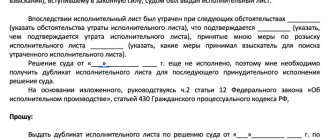According to FSSP statistics for the first half of 2022, about 1.2 million judicial acts on the collection of alimony were being executed by the FSSP. In approximately half of all these cases, alimony providers are in arrears. Of course, not all of them are malicious non-payers of alimony, but there are also plenty of them, and many of them are far from poor people. Therefore, the state provides for enforcement measures that are used in extreme cases. Let's figure out what alimony debt can lead to imprisonment and when you should be wary.
How to go to jail for alimony: conditions for establishing such a punishment
The impending prison sentence acts as a catalyst for the negligent parent.
Not every debtor can be imprisoned for failure to pay alimony, since life is unpredictable, and a person can lose his job at any moment. Therefore, judges consider each case in connection with the individual circumstances under which they may be imprisoned for unpaid alimony. According to Article 157 The Criminal Code of Russia allows a persistent offender to be imprisoned for alimony if his behavior confirms the signs of a crime. The question arises: can they be imprisoned for failure to pay child support? A malicious evader who should be given a prison sentence for failure to pay alimony is considered to be a person who commits the following actions:
- non-payment of money for more than 4 months;
- change of place of registration;
- concealment of income;
- being wanted due to non-payment;
- reluctance to look for work;
- formation of significant alimony debt.
Regulatory framework
| Laws | Articles |
| Criminal Code | Article 73 establishes the rules on conditional sentencing. Article 157 contains a list of punishments that can be imposed on criminals who do not pay alimony. |
| Code of Administrative Offenses | Chapter 28 describes the actions of the bailiff when initiating proceedings in an administrative case. Chapter 29 describes the actions of the magistrate when making a decision in an administrative case. Article 4.6 establishes the “term of conviction in administrative cases.” Article 5.35.1 establishes administrative penalties for non-payment of alimony. |
| Code of Criminal Procedure | Chapter 32 establishes the procedure for conducting an inquiry. |
Concealment of income, change of registration - can they be sent to prison for alimony in these cases?
The case of concealing income is not the only one in our country. Can they be jailed for failure to pay child support? More than half of the male population in Russia receives wages “in envelopes,” which is an offense.
Those debtors who want to hide from bailiffs sin by changing their place of registration. Will there be a prison sentence for failure to pay child support in this case? Finding a person wanted for non-payment of alimony is one of the signs of a malicious offense. The reluctance to look for work becomes the fact that a person deregisters himself from the Social Employment Center. The reasons for this action can be different: working conditions are unsuitable, low wages, lack of prospects for further growth.
When do you need to support your parents?
You will probably be very surprised, but the Family Code (FC RF) also provides for the obligation of the younger generation to support the “disabled and in need of help” of the older generation.
However, this norm can be neglected if the parents were previously deprived of their rights. In addition, if the court finds that the “ancestors” did not fulfill their duties (but were not deprived of their rights), then the children can also be released from their maintenance.
Counteractions to repay alimony debt
In case of prolonged evasion of the alimony payer from fulfilling his duties, a significant debt arises. Can a court impose a prison sentence for failure to pay child support? This depends on the length of the non-payment period. According to Art. 157 of the Criminal Code of Russia, the period allowing a similar preventive measure to be applied to a debtor, under which it is possible to be imprisoned for alimony, becomes 3 months.
Many malicious debtors, in order not to be imprisoned for alimony, buy toys, food and wardrobe items for their child. Judicial workers cannot imprison fathers who have taken the path of reform. Judges can imprison you for non-payment of alimony if the moment of non-payment of alimony is notarized and appears several times in the court case. The plaintiffs have a question: can they be sent to prison for failure to pay alimony for the maintenance of an heir on time? This issue, which concerns the period of non-payment, is regulated by the administrative-legal method in the form of charging a penalty.
How to apply to court
If the patience of the alimony recipient has run out, he can file a statement of claim and go to court in search of justice.
An example of an application for alimony can be found here.
The claim must be drawn up in accordance with the law (Civil Code of the Russian Federation, Art. 131) and contain the following information:
- name of the judicial authority;
- information about the plaintiff (full name, address of registration, passport details, contact telephone number);
- information about the defendant debtor (full name, registration address and last known place of residence, telephone number, etc.).
- a detailed description of all the circumstances of the case (how the debt arose, attempts to resolve the issue, etc.);
- the amount of financial claims (claim price).
The statement of claim must be accompanied by copies of all documents you have regarding this case. An experienced lawyer will help you draft your claim correctly.
Cases of punishment of a defaulter under Article 157 of the Criminal Code of the Russian Federation
Cases of punishment of alimony defaulters in the form of imprisonment have occurred in judicial practice. Art. 157 of the Criminal Code of Russia provides for such types of punishment as:
- performing corrective labor for a period of up to 1 year;
- imprisonment for up to 3 months;
- imprisonment for up to 1 year.
In 2022, a person who evades payment of alimony benefits for a long time, up to 12 months, may be sent to prison if the legislation does not change. A judge can put a debtor in prison for a period of up to 3 months for alimony, based on an analysis of the individual circumstances of the defendant’s life. Having a criminal record for non-payment of alimony carries with it a number of unpleasant consequences, such as:
- signing a decree not to leave the country;
- limited ability to travel within one country;
- prohibition from holding leadership positions.
You can be jailed for child support not only for a person who has children, but also for refusing to support elderly parents.
Evasion of alimony payments
If a person decides to deliberately evade paying alimony, he will hide his income, may change his place of residence and personal data, and also perform many other actions aimed at deliberately evading payment of alimony.
Despite this, the recipient of alimony can appeal to the relevant authorities or court, after which he will be actively encouraged to pay the debt. Failure to pay alimony may entail first administrative, then criminal, and additionally civil liability.
Such liability may also arise for a bona fide payer due to circumstances beyond his control. You need to carefully consider this issue and ensure that there are no delays or arrears in payments.
The procedure for bringing a debtor to criminal liability
The procedure for bringing a debtor to criminal liability begins from the moment the defendant is brought to pay alimony. A document regulating the payment of alimony, drawn up on a voluntary basis and certified by a notary, acquires the force of a writ of execution submitted to the bailiff service for the purpose of collecting alimony. A lawsuit for child support that is granted by the court ultimately results in the issuance of a writ of execution to the plaintiff.
The plaintiff shows the writ of execution to the employer, who withholds the required amount from wages in favor of supporting the children. The document is also submitted to the bailiff service, which initiates enforcement proceedings. In certain cases, the debtor's account is seized and he may be given a prison sentence for failure to pay alimony.
If the debtor continues to evade the payment of alimony, according to the articles of the Code of Administrative Offenses of the Russian Federation, a fine of several thousand rubles is assessed. A court ruling deciding the case in favor of paying a fine can become significant evidence in bringing the debtor to criminal liability, who may be imprisoned. It became possible to initiate a case to bring the defaulter to criminal liability through bailiffs and by contacting the Ministry of Internal Affairs. The case materials are submitted to the court, and during the consideration of the case, a verdict is made on the guilt or innocence of the person who may be imprisoned.
Arbitrage practice
The criminal case described below was considered by the magistrate of the Kochkurovsky district of the Republic of Mordovia in July 2022.
As a result of the consideration of the case, the defaulter was sentenced to correctional labor for 6 months and to withholding 10% of income from earnings in favor of the Russian Federation. This punishment can be considered mild. It was issued for the following reasons:
- The alimony payer admitted that he was guilty of the offense committed and asked for legal proceedings to be carried out in a special manner.
- The defaulter had no criminal record, had a satisfactory reference from neighbors, and was not registered with a psychiatrist.
- The crime committed by the alimony worker is characterized by minor gravity.
- The alimony payer repented for the crime committed.
- He also has a dependent minor, which is considered mitigating circumstances.
- No aggravating circumstances were discovered during the trial.
When should you support your ex-spouses?
We open the RF IC. Article 90. And let’s see when the former other halves have the right to receive maintenance from the first halves:
- During pregnancy and three years after the birth of the child. It is even clarified that this only applies to women.
- A disabled spouse who became disabled either during the marriage or within one year after the divorce. (You can’t call a good deal a “marriage.”)
- A needy ex-spouse of retirement or pre-retirement age.
These obligations terminate in the event of: the spouse receiving assistance entering into a new marriage, the expiration of the period established in paragraph 1, or death.
So, we have looked at: what alimony is, who, when and to whom, and most importantly, why it should be paid. And now let’s move on to the most interesting thing - what kind of responsibility awaits the alimony worker if he voluntarily does not want to fulfill his civic duty.
Deprivation of parental rights
Failure to pay child support may also result in termination of parental rights. The conditions under which a parent may cease to be such by law are as follows:
- Malicious evasion of alimony payments.
- Complete lack of parental involvement in the child's life.
Deprivation of parental rights is a complex procedure. It entails the following consequences:
- For a defaulter who loses the right:
- protect the interests of the child;
- reclaim the child from other persons;
- give consent to the emancipation of a child under 16 years of age;
- receive pension benefits in connection with the death of a child (breadwinner);
- inherit from a child by law.
- change the child’s first name, last name and even patronymic without the consent of the other parent;
- travel abroad with the child without the permission of the other parent;
- allow the other spouse (stepfather, stepmother) to adopt a child without obtaining consent from the natural father/mother;
- prohibit the defaulter from meeting the child, as well as taking part in his education and upbringing.
- For the second parent who is raising the child. He has the right:
- change the child’s first name, last name and even patronymic without the consent of the other parent;
- travel abroad with the child without the permission of the other parent;
- allow the other spouse (stepfather, stepmother) to adopt a child without obtaining consent from the natural father/mother;
- prohibit the defaulter from meeting the child, as well as taking part in his education and upbringing.
- For a child who is released from the obligation to support a deprived parent in old age or to pay him alimony.
If a parent does not pay child support for several years, he has every chance of losing all legal ties with his child.
Expert opinion Kuzmin Ivan Timofeevich Legal consultant with 6 years of experience. Specializes in the field of civil law. Member of the Bar Association.
A person who does not want to provide for his child should know that he will constantly receive letters sent by bailiffs. Bailiffs can also visit his home.
It is quite possible that the parent receiving child support will also come with them. Perhaps he will even be the initiator of such visits, because this possibility is enshrined at the legislative level.
Many payers ask what will happen if they don’t pay child support.
. Let's look at this question in more detail.







